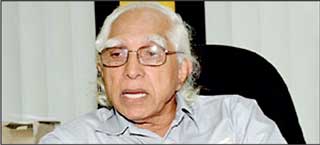Monday Feb 16, 2026
Monday Feb 16, 2026
Wednesday, 15 December 2021 00:00 - - {{hitsCtrl.values.hits}}
Janashakthi Insurance Founder Chandra Schaffter says the introduction of unemployment benefits is not viable, given the challenges faced by the Government. Following are excerpts of an interview with Schaffter:
Schaffter:
Q: The Government is proposing a contributory pension scheme; is this a viable option given the current challenges faced by the private sector?
A: In my view, the best option is that you do not touch the provident fund or the ETF and that you start a separate contributory scheme. The corporate sector shies away at any additional benefit to employees on the pretext that it puts up their costs and they cannot afford it. However, a few companies would welcome such a move if an acceptable pension policy is made available.
Q: Can the EPF contribution be used by the Government to offer a pension to private sector employees?
A: As a compromise, I suggest that 50% of the EPF contribution be used to offer a pension to the private sector employees. However, it must be managed professionally with private sector participation.
Q: Should employers be permitted to start independent pension funds to which employees also contribute? How should this be regulated?
A: This is ideal where employers start a pension fund to which they contribute, say 10% and employee contributes 5%. But they should not manage their own pension fund. Instead, they insure it with one of the licensed insurance companies, who are doing pension business.
Q: Why are you against unemployment benefits? Because a benefits scheme replacing the current compensation formula will help companies to restructure to remain competitive?
A: I am not against unemployment benefits. I am simply of the view that it is unviable. How do you pay unemployment benefits – the Government has to do it and undertake to pay benefits to all those who lose their jobs/have no work. This is what is being done in the UK or was done, costing the government an enormous amount. There are so many other more important public expenditures that should be met. For instance, I have suggested that those over 55, who have not been in government service, and have no provident fund/or if they had provident funds, the retirement amount is less than Rs. 2 million, be
 |
| Janashakthi Insurance Founder Chandra Schaffter |
paid a lifelong pension of Rs. 5,000. The money for this to be raised through the EPF that is about 2% of the EPF income and also by charging a National Social Security charge from all profitmaking organisations, in a manner worked out by mutual discussion. The employer can say that the employee should be with him for five or 10 years to qualify for the employer’s contribution. This would encourage the employees to stay and also not cause undue loss to the employer if an employee leaves after a short period.
Q: Can the insurance industry be engaged by the Government to develop a pension scheme for the private sector?
A: The insurance industry is already selling pensions to the private sector. Yes, it can be done.
Q: As a veteran in the insurance industry, what should the Government be doing if a pension scheme is desperately needed, given that the majority of our retirees don’t have adequate retirement benefits?
A: I have been advocating for a long time that private sector employees should have pensions. I see it as an urgent necessity, and there are two ways of doing this:
a. Take 50% out of the EPF and buy a pension with that;
b. Introduce a compulsory plan whereby employees and employers are compelled to contribute.
(The writer is reading for a PhD and teaches at the University of Buckingham.)